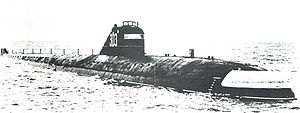
К-3 was a project 627 "Кит" (kit, meaning "whale"; NATO reporting name "November") submarine of the Soviet Navy's Northern Fleet, the first nuclear submarine of the Soviet Union. The vessel was prototyped in wood, with each of five segments scattered between five different locations about Leningrad, including the Astoria Hotel.
On June 17, 1962, by this time under the command of Zhiltsov, К-3 reached the North Pole underwater, the first among Soviet submarines (a feat was performed nearly four years earlier by USS Nautilus). The submarine also surfaced on the Pole (a feat performed 3 years before by USS Skate). For this voyage, she was awarded the name Leninskiy Komsomol (ЛенинÑкий КомÑомол) on October 9, 1962, and her crew, rather than training in military operations, began taking part in many congresses and conferences. This idle life continued until the summer of 1967 when a boat that had been scheduled for patrol in the Mediterranean Sea was unavailable. К-3 was tasked with that patrol. She was assigned a new commander, Captain Second Rank Stepanov, and her executive officer arrived aboard only two hours before she put to sea. Whatever the initial material condition of the boat, the crew was not ready for sea. By the time they reached the Mediterranean, the air regeneration system had failed and the temperature on board was 35–40 °C (95–104 °F).